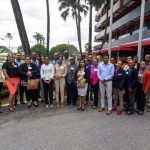Caribbean Weather Heads at Congress of WMO

(Caribbean Meteorological Organisation Press Release) English–speaking Caribbean States were well represented at the Eighteenth World Meteorological Congress (Cg18) which took place in Geneva, Switzerland, from 3 -14 June 2019. The Congress is the Supreme body of the World Meteorological Organization (WMO) – the Geneva-based United Nations Specialised Agency that coordinates global activity in weather, climate, water, and related aspects of the environment.
Directors of Meteorological Services and other official delegates from the Caribbean Meteorological Organisation (CMO) Member States of Barbados, Guyana, Jamaica, Saint Lucia, the British Caribbean Territories (BCT), and Trinidad and Tobago, were involved in the two-week Congress. In addition, the Caribbean was also represented by the Directors of National Meteorological Services from the Bahamas and Curaçao and Sint Maarten.
The WMO Congress meets once every four years and brings together delegations from its 193 Member States and Territories to determine, among others, the general policies, strategic priorities, and operational plan of the Organisation. Several leaders of Governments from around the world addressed the Congress on the socio-economic benefits of weather, water, and climate to their countries and regions. Additionally, a broad cross-section of global stakeholders contributed to special sessions on public-private engagement and operational hydrological services as an integral part of the WMO activities.
The Congress debated and approved a new governance structure for the WMO (https://public.wmo.int/en/media/press-release/world-meteorological-congress-approves-sweeping-reforms). The reform will enable the WMO to have a stronger focus on extreme weather, water resources, the ocean, coordinated climate services, environmental degradation, urbanization, and public health; while harnessing technological advances from satellites, supercomputing and data integration to translate science into services for society.
Congress also approved greater and controlled engagement with the private sector and academia and more structured collaboration with development agencies. The new governance structure is aligned to the strategic plan, which sets five long term goals and top overarching priorities including:
• Enhancing preparedness for, and reducing losses of life and property from hydrometeorological extremes,
• Supporting climate-smart decision making to build resilience and adaptation to climate risk, and
• Enhancing socioeconomic value of weather, climate, hydrological and related environmental services.
Caribbean delegations were involved in negotiations on the WMO long-term plans and budget allocations, which included increasing the level of support to developing countries and regional operations—to meet increasing demands for service delivery to specific sectors such as: aviation, disaster management, water, marine, agriculture, health, energy, and tourism.
For example, Caribbean delegates supported the establishment of a Global Multi-hazard Alert System that would compile information from existing or planned national and regional systems and boost impact-based forecasting services, which focus on what the weather will do rather than purely on what the weather will be.
Directors of Meteorological Services endorsed an earth-system research approach and measures to strengthen early warnings against hazards like floods and tropical cyclones and to ensure that their authoritative weather, climate, and water information is part of humanitarian operations.
Regional interest also focused on the delegates’ approval of education and training activities including the WMO Global Campus, a collaboration among WMO Regional Training Centres (RTCs) to help overcome the gap between training demand and supply, which received very positive feedback from Members.
The Caribbean Institute for Meteorology and Hydrology (CIMH) co-chaired the WMO Global Campus for the past four years, while developing and hosting the WMOLearn Calendar of Training Events. The recent Congress further resolved that leadership and management development in national meteorological services should be given prominent attention; meanwhile CIMH, a designated WMO RTC since 1978 and innovator in education and training, has offered leadership and management courses to its students since 2015. The CIMH, a regional research, data and instrument centre and technical arm of the CMO, also hosts the WMO Regional Climate Centre for the Caribbean; and the Pan American Centre for the WMO Sand and Dust Storm Warning Advisory and Assessment System.
The Caribbean also featured in the election of officials to oversee the work of the WMO over the next four years. The WMO Congress re-appointed Professor Petteri Taalas of Finland as its Secretary General. Professor Gerhard Adrian of Germany was elected as President of the WMO. Also elected were: the First Vice-President, Dr Andrea Celeste Saulo, from Argentina; Second Vice President, Dr Albert Martis, from Curaçao and Sint Maarten; and the Third Vice-President, Dr Agnes Kijazi, from the United Republic of Tanzania. The Permanent Representative of the British Caribbean Territories (BCT) and Coordinating Director of the Caribbean Meteorological Organization (CMO) Headquarters Unit, Dr Arlene Laing, was elected to the WMO Executive Council ensuring the BCT’s continued presence on the Council since 1983. The 71st Session of the WMO Executive Council was held from 17 to 19 June 2019.
The Executive Council is the second highest body of the WMO. It implements the decisions of the WMO Congress, coordinates programmes, manages the budget, considers and acts on resolutions and recommendations from the regional associations and technical commissions, and studies and makes recommendations on matters affecting international meteorology and related activities.
Source: Caricom Today

 Previous Post
Previous Post Next Post
Next Post